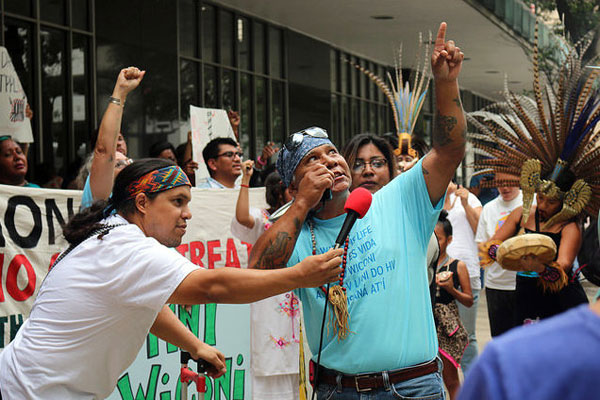- La Feria Community Holds Succesful Business Mixer Event
- Little Nashville to Take Place in Downtown Mercedes
- Lions Basketball Captures District Gold
- La Feria ISD Students Compete in Regional Chess Tournament
- Lions End First Half of 32-4A on a High Note
- La Feria ISD Held Another Successful Parent Conference
- Strong Appearance for Lions at Hidalgo Power Meet
- LFECHS Students Get to Meet Local Actress
- Students Participate in Marine Biology Camp
- Two LFECHS Students Qualify for All-State Band
Natives, Environmentalists Protest in Houston Over Pipeline
- Updated: October 28, 2016

Native Americans and environmental groups protest at the Houston headquarters of Energy Transfer Partners, the contractor building Dakota Access and other pipeline projects. Photo: Grassroots Global Justice Alliance
by Mark Richardson
HOUSTON – A coalition of environmental groups and Native American activists has taken protests over a controversial pipeline to the Houston offices of the company building the project.
Dressed in traditional tribal garb, chanting and dancing to native drums, dozens gathered this week at the headquarters of Energy Transfer Partners, the contractor building the Dakota Access Pipeline, to support the Standing Rock Sioux Tribe’s efforts to halt construction on the project.
Donna House, an organizer with the Navajo Chapter of the Black Mesa Water Coalition, said they gathered in Houston because it is the headquarters of the oil industry.
“Houston has had companies that have had incredibly destructive impact on Indian lands and in Native American natural resources, our sacred sites, our water,” she said.
Protests in North Dakota, some of which have turned violent, have been aimed at blocking the 1,200-mile oil pipeline, which would cross native lands. In response to the Houston protest, Energy Transfer Partners issued a statement saying they are taking all necessary steps to protect cultural resources, the environment, and public safety.
In addition to Dakota Access, the groups in Houston were protesting another of the company’s projects, the Trans-Pecos Pipeline in West Texas. House says that project runs through ancestral tribal lands and would endanger environmentally sensitive areas.
“It’s important that Texas recognize that not only that they have the fossil-fuel industry here that’s destructive, but also a pipeline that’s going through lower income communities, people of color communities, and indigenous territories,” she added.
After protests turned violent in North Dakota, a federal judge granted an injunction in September that temporarily stopped construction, but it was lifted last week. The federal government asked the company to voluntarily halt construction, but it has refused.


